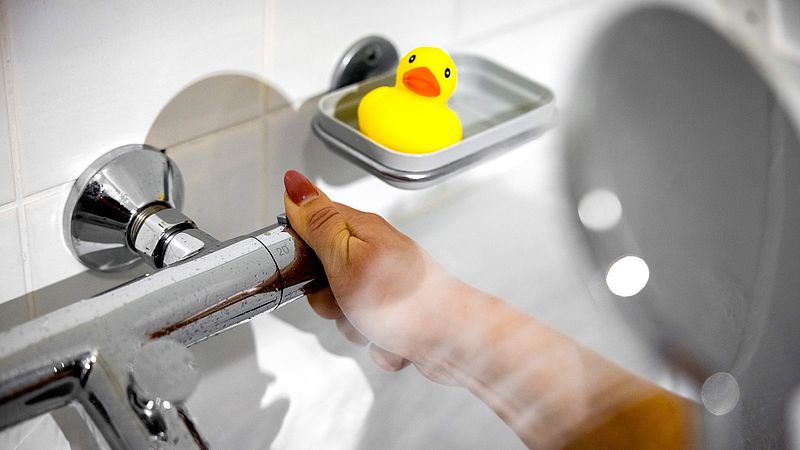Shorter shower, colder shower or just a towel. Due to the high energy costs, more and more people are looking for a cost-saving alternative. What options are there? And are they good for you? We asked the dermatologists.
“The reason (energy savings, ed.) It’s not funny, but it’s really better for your skin,” says dermatologist Annemie Galimont of the Dutch Association of Dermatology and Venereology. She is therefore happy that people are finally working on showering less often and faster.
“Not needed every day”
But of course it’s not. According to dermatologist Menno Gaastra, showering every day is still the norm. “We’re used to not being able to smell, because anything you smell a little bit is seen as dirty. But in Africa, for example, you’re declared dead if you don’t smell a little bit.”
“It’s normal for everything to smell like flowers. But you just have body odors that are there. You don’t have to shower every day for that,” she adds. “Plus, your skin doesn’t need to shower every day.”
also look
1. Shower less often (2 to 3 times a week)
In fact, we all shower “a lot” together, Gaastra says. “But having a shower 2 or 3 times a week is more than enough. Hot water dries out the skin a lot and it’s also very calcareous, which dries out the skin even more. So don’t shower too hot and certainly not too hot. long.”
Dermatologist Galimont agrees. “Your skin is like a coat,” he says. “There is a barrier to it. If you hit it, your skin dries out. Showering 2 or 3 times is fine, unless you have visible dirt on your skin, come into contact with chemicals, or sweat a lot.” not even that much, but sweat contains substances that can damage your skin. Think, for example, if you have a wound, then sweat stings.”
also look
2. Cold shower
Cold showers definitely save on heating costs, says dermatologist Gaastra. “But it’s also better for your immune system. Just like cold swimming, it’s not bad for your skin at all.”
But, Galimont adds, “If you have chilblains or chilblains or are otherwise vulnerable, taking an ice-cold shower isn’t recommended.” According to Galimont, you should therefore also think carefully about your well-being. “There’s nothing against a cold shower, but I think it should be bearable. I recommend lukewarm water then, and then 2 or 3 times a week.”
also look
3. Damp towels
An alternative to the waterless shower is offered by wet wipes. According to Gaastra, this at least ensures you freshen things up nicely. They are mainly used in healthcare to refresh the genitals, armpits and groin. “But you have to be careful with them. They come in fragranced and unscented form. The latter is better for your skin. And it contains preservatives. If you use them often, you can make yourself allergic to them more quickly.”
Galimont also sees it as a reasonable alternative, much to his surprise. “At first we thought we were seeing a lot of misery in nursing homes. But we see little problem with it. And there’s not a lot of moisture involved, so you don’t dry out quickly.”
also look
4. The old fashioned towel
Both dermatologists are particularly in favor of the old washable towel as an alternative to the shower. “Just with water, you don’t even have to use soap,” says Gaastra. “Your skin will get used to the fact that you no longer shower every day.”
“And it’s also good for the environment, of course,” adds Galimont. “You can use this fine between showers. You can use a little mild soap, but you don’t want to remove the oily layer on your skin by using too much soap.”
also look
5. Don’t take a shower
So you don’t have to shower every day. But swearing not to wash completely isn’t the intention either, both dermatologists point out. “Every now and then you’ll have to rinse off the dirt,” says Galimont. “Your skin refreshes its top layer regularly, but at some point the dirt will stick to you and this can clump. Just look in your belly button or between your toes.”
“This is especially important in the anus and genitals, because something that starts to smell always sticks there. This is especially true of old sweat. It’s so fresh that you occasionally put a piece of cloth on it. And this doesn’t necessarily have to be done in the shower,” Gaastra points out.
Fireworks lighting. In the last two years, this has not been allowed during the end of the year due to corona. And in twelve municipalities it is not even allowed on New Year’s Eve, such as in Apeldoorn, Nijmegen, Amsterdam and Rotterdam. These municipalities have announced a blanket ban on fireworks for the first time. Other municipalities are also thinking about this. You can leave your question about this below.
With EenVandaag Asks we investigate how we can engage you more in our topics. We do our best to answer as many questions as possible.


